In this article:
Rosehip oil is extracted from the rose plant, mainly from Rosa canina and its related varieties. It is derived by pressing the fruit and seeds of the rose plant to extract the very nutritious oil.
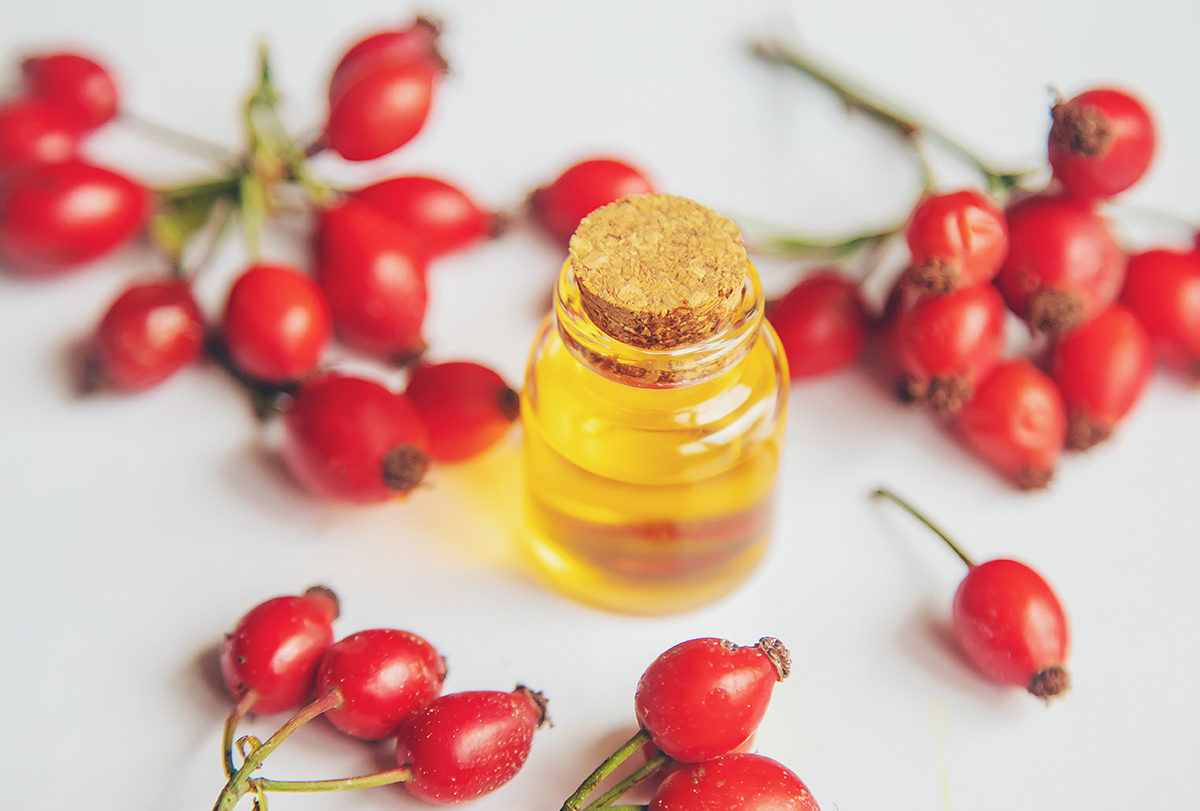
Rosehip oil contains unsaturated fatty acids that are great for your skin. The essential fatty acids in the oil are omega-3, omega-6, and omega-9 fatty acids, namely, linoleic acid, alpha-linolenic acid, and oleic acid, respectively. (1)
Out of all fatty acids, linoleic acid is the most abundant in rosehip oil, and this fatty acid is very light compared to the others. People who suffer from clogged pores or acne breakouts have low levels of linoleic acid. So, rosehip oil can be good for such people.
Does Rosehip Oil Clog Pores?
Rosehip oil does not clog pores. You always want to use oils and products that do amazingly well for the skin but don’t clog your pores. Rosehip oil is perfect for this as it is noncomedogenic. It is very gentle on your skin and is moisturizing as well. It regulates the skin’s sebum/oil production.
Rosehip oil naturally contains the fatty acids your skin needs for nourishment. It is also rich in vitamins and antioxidants that prevent future acne breakouts. (2)(3)
Research has illustrated that rosehip can do wonders for your skin. Rosa canina has been found to diminish red cell membrane breakdown, thereby increasing cell longevity.
Furthermore, the antiaging effects of Rosa canina are associated with its antioxidant activity, as particular phytochemicals in it can hunt oxygen species produced by UV radiation, reducing skin damage. Also, the anti-inflammatory effect of various constituents of Rosa canina is connected to protection from UV-induced inflammation and damage.
Finally, rosehip contains polyunsaturated fatty acids, which are the major contributors to its effects on increasing cell longevity and preventing cell membrane damage. (4)(1)
Note: Clogged pores can cause mild or noninflammatory acne, which is characterized by comedones (blackheads or whiteheads). These are nothing but clogged pores in the skin. The color of blackheads is due to the reaction of the skin pigment, melanin, with oxygen in the air. Rosehip oil can also come in handy to fight this hyperpigmentation. (1)
However, at the end of the day, even though rosehip oil is a dry oil, it is still an oil, so you can expect it to sit as an added layer of oil on your already clogged pores or worsen your acne situation.
In most cases, rosehip oil will be good for controlling inflammation that comes with acne, but in some cases, it has been observed that it can make the acne worse. This is due to an additional layer of oil it adds to your already clogged pores.
Whether or not you’ll benefit from rosehip oil is an experiment you’ll have to perform on your skin, and you’ll have to see if it works for you. (2)(3)
How to Apply Rosehip Oil Correctly
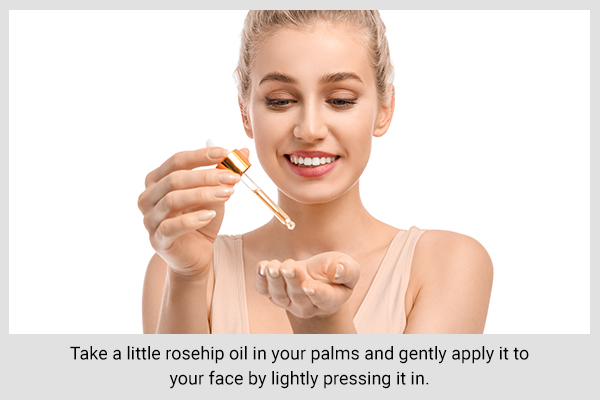
It is very easy to correctly apply rosehip oil. All you have to do is take a little rosehip oil in your palms and gently apply it to your face by lightly pressing it in. You can try to do it in circular motions so that it spreads evenly on your face.
Before bedtime is the perfect time for rosehip oil application to the skin. You can use it with your sunscreen during the daytime or mix it with another serum or moisturizer for easier application. (1)
Moreover, to actively prevent your pores from clogging, you should clean your face with a gentle, good-quality cleanser daily. This practice is proven to maintain the health of the skin.
It is also a good idea to invest in a face mask that hydrates the skin and a facial scrub that exfoliates and prevents the buildup of dead skin cells, which can be responsible for clogging pores. After these, using essential oils such as rosehip oil for controlling sebum production is the final touch needed for preventing clogged pores.
Choosing and using the right rosehip oil is important. Here’s how you can make the correct decision:
- Make sure the oil is derived from natural and pure plant sources only without any artificial ingredients that may have adverse reactions on your skin.
- Ensure that the product you’re using is tried and tested. It should be approved by regulators and supported by dermatologists.
- Check whether the rosehip oil is suitable for your skin type or not (i.e., for oily or dry skin).
Benefits of Rosehip Oil for the Skin
Rosehip oil offers the following benefits:
1. Moisturizes the skin
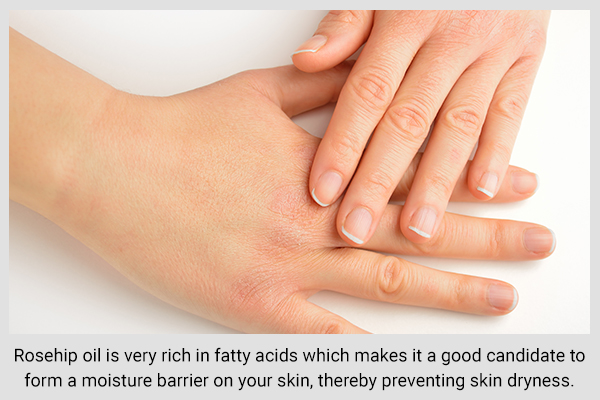
Rosehip oil is very rich in fatty acids, which form a moisture barrier on your skin, thereby preventing skin dryness. In other words, it is very good for moisturizing dry skin.
2. Prevents wrinkles and fine lines
Rosehip oil contains vitamins A and C, which have soothing effects on the skin and promote collagen formation. These effects are helpful in the reduction of wrinkles and fine lines. (4)
3. Prevents discoloration
If your skin is having several dark spots or patches, rosehip oil can over time lighten them and reduce any discoloration. It can also reduce any redness on your skin because of its anti-inflammatory properties. (1)
4. Provides antioxidants
Rosehip oil is rich in antioxidants that are required to fight free radicals and prevent oxidative stress, which often causes inflammation and signs of aging. This makes it a good addition to your skin care drawer. (3)
5. Prevents acne breakout
Rosehip oil has anti-inflammatory and antimicrobial actions. (1) These help control excessive oil production and prevent acne. Also, it is noncomedogenic oil and lightweight, because of which it will not clog your pores. (1)
Who Should Not Use Rosehip Oil
Several studies on rosehip oil claim that this conventional herbal therapy has a high safety profile. So, topical use of rosehip oil is deemed to be safe for most people, and there aren’t any described policies for its use in different skin types.
Contrary to the famous assumption, you don’t have to skip the use of face oils if you have oily skin. Oils such as rosehip oils are dry oils that minimize the appearance of pores and provide the skin with various benefits.
However, periodic mild allergic reactions have been reported in some of those who used rosehip oil but without serious adverse effects. If your skin is very sensitive, you can always do a patch test first before using this oil. (3)
How to Use Rosehip Oil for Acne-Prone Skin?
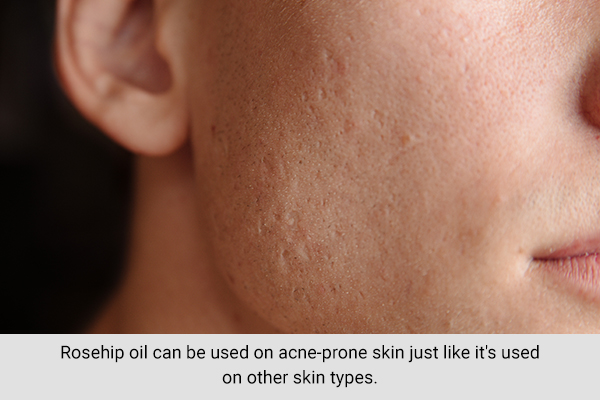
Rosehip oil can be used on acne-prone skin just like it can be used on other skin types as it doesn’t make the skin oily. This oil comes from natural sources and is, in fact, known to reduce oil or sebum production.
Rosehip oil also fights free radicals and is good for people with oily skin. It is known to have an incredibly remarkable impact on acne scars and various other skin issues. You just have to make sure you apply it evenly to your face. (5)
Rosehip oil is very rich in linoleic acid, which has been studied to do wonders for acne and acne scars by reducing hyperpigmentation. So, it can be used as a spot treatment. (1)(6)
What Should Not Be Mixed With Rosehip Oil?
It is best to avoid mixing rosehip oil with retinol. Retinol is a type of retinoid and is commonly used in skin care products in concentrations varying from 0.1% to 1% or even more.
It is critical to use retinol in reasonable concentrations according to the tolerance level of the user. Overuse of retinol or its use in high concentrations can have side effects such as: (7)(8)
- Irritation
- Mild burns
- Inflammation
Rosehip oil also comprises some amount of retinoic acid, which is also a retinoid, in a concentration of 0.03%. This tretinoin is considered to be very potent and causes photosensitivity at a concentration of 0.05% or higher. (9)(10)
Hence, it is best to avoid the use of rosehip oil and retinol together as they can lead to high concentrations of retinoids on the skin, which can lead to adverse reactions.
What Are Some Side Effects of Rosehip Oil?
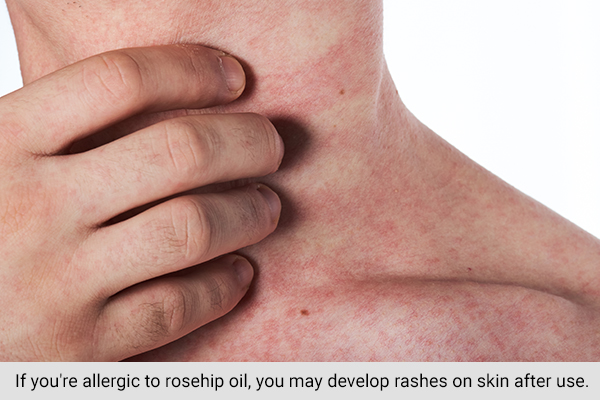
Rosehip oil is generally deemed safe, but occasionally, a few people may experience mild side effects while using it.
- If used unduly or in high amounts, it may make you dizzy or give you a nauseating feeling. If this happens, go seek medical assistance immediately. (4)
- If you have sensitive skin rosehip oil, you may be prone to rashes and irritation. So, before application, perform a patch test by using a little amount of rosehip oil on a tiny portion of your skin to be certain that you’re not allergic to it.
- In some cases, the use of rosehip oil can result in watery eyes and a runny nose. If you experience these, talk to a medical professional.
Most-Asked Questions About Rosehip Oil
Why is my rosehip oil turning yellow?
If kept for an extended period, rosehip oil can turn a little yellow. But it is nothing to worry about since it is pretty usual and does not compromise the oil’s efficacy or lead to unfavorable effects on the skin.
After how long does rosehip oil show effects?
Rosehip oil can take around a few weeks to produce results if used regularly. It will also not cause any unwanted reactions. If you do experience reactions, stop using it and seek medical help.
Is rosehip oil a dry oil?
Yes, rosehip oil is a dry oil because it is easily absorbed by the skin. (5)
Final Word
Rosehip oil is a naturally derived remedy that is great for a lot of skin problems. It aids in the improvement of the appearance of the skin by reducing scarring and discoloration.
It promotes the overall wellness of your skin because of its antioxidant and anti-inflammatory activities. Just ensure that you use it regularly and distribute it evenly on your skin.
- Was this article helpful?
- YES, THANKS!NOT REALLY


